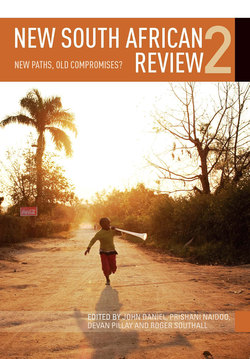Читать книгу New South African Review 2 - Paul Hoffman - Страница 23
На сайте Литреса книга снята с продажи.
CONTESTATION FROM THE OUTSIDE
ОглавлениеThe formation of the Congress of the People (Cope), after the ousting of Thabo Mbeki as president in September 2008, raised expectations that ANC dominance would be challenged, and a realistic opposition would emerge. Cope was led by former ANC chair-person and UDF leader Mosiua Lekota as president, with former Cosatu general secretary and premier of the Gauteng province Mbhazima Shilowa as vice-president. It scored seven per cent of the national vote in the 2009 elections, less than the twelve to twenty per cent predicted before polling started, but a reasonable return for a party that was only a few months old. However, severe internecine squabbles between the Lekota and the Shilowa factions hobbled the party. Repeated attempts in 2010 to hold a congress to resolve the leadership issue failed, leaving the party in complete disarray. In addition, attempts to form an alternative labour movement to Cosatu, led by former Cosatu president, Willie Madisha, proved moribund. By 2011, Cope was clearly not a viable alternative to the ANC Alliance, and the party performed miserably in the municipal elections.
The 2010 public sector strikes, and Cosatu’s flirtation with civil society groups, raised hopes among some that the labour federation might leave the alliance earlier than expected. While that hope remains, it was too early for Cosatu to accept an invitation to attend the democratic left conference in January 2011,17 which launched the Democratic Left Front (DLF), a broad coalition of left formations representing small groups of community activists and intellectuals from around the country. Cosatu had just come out of an ugly spat with its alliance partners over the civil society conference, and the DLF’s intention to build an alternative left pole of attraction was too risky politically.18
The DLF includes NGOs and social movements that emerged in the late 1990s to fight water and electricity privatisation, home evictions, environmental degradation, and lesbian and gay discrimination, among other social issues – and also includes prominent individuals who had left the SACP.19 It places emphasis on eco-socialism, participatory-democracy, feminism, gay rights, and a nondogmatic approach to Marxism (DLF, 2011).
However, it is clear that any alternative to the alliance is fraught with difficulty in the absence of a Cosatu breakaway. Whether Cosatu’s membership will continue to offer support to the ANC Alliance in the future depends mainly on whether it continues to see benefits accruing from an ANC government – mainly to itself as organised, employed workers in permanent jobs, but also to the larger working communities within which it lives.
